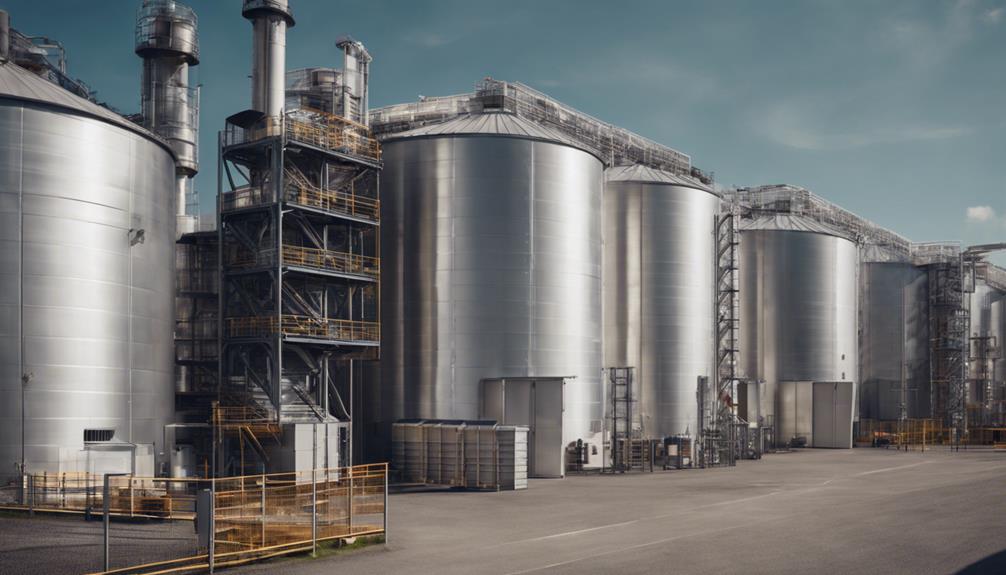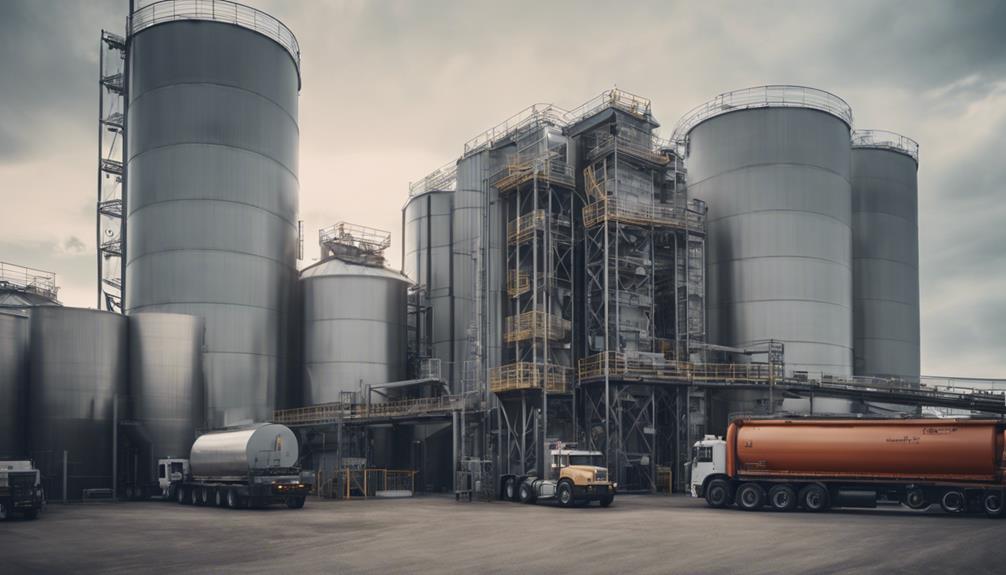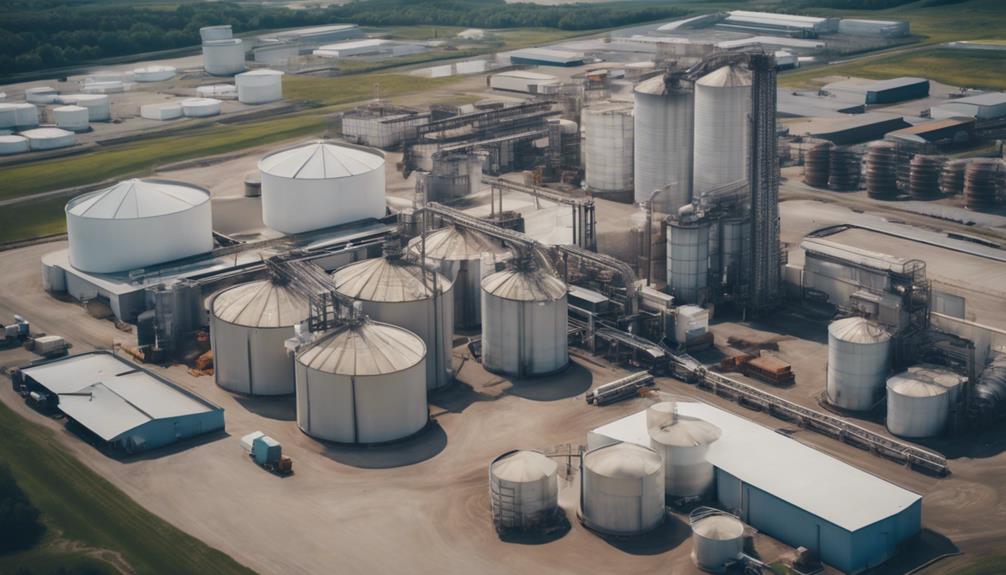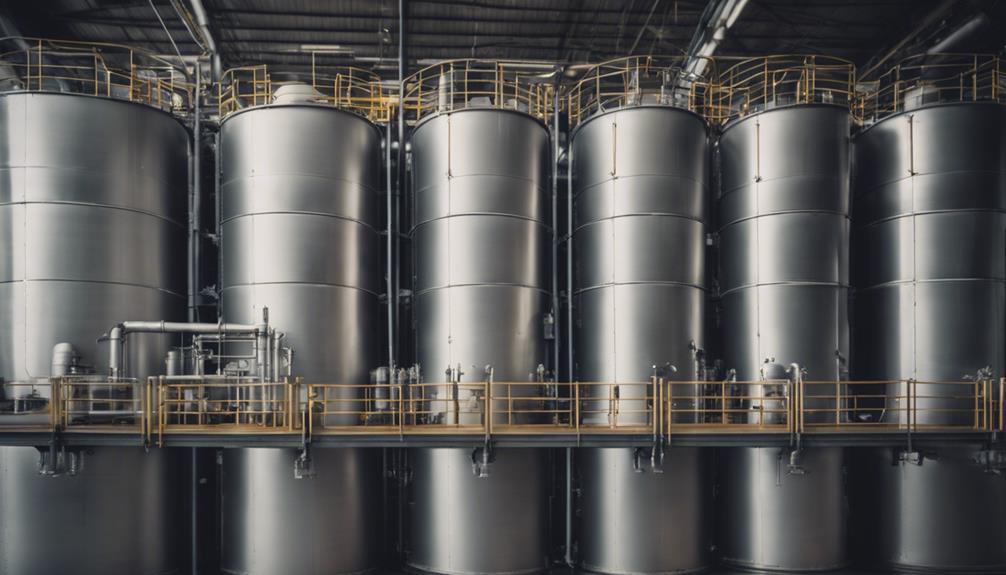Bulk storage silos are essential for businesses aiming to enhance efficiency and save costs. They maximize storage capacity, protect materials, and streamline production. By optimizing storage, enhancing operational efficiency, and centralizing storage, silos improve workflow and reduce transportation expenses. They also facilitate efficient inventory management, secure storage, and enhanced material handling processes. Overall, silos play a pivotal role in enhancing material handling efficiency, reducing maintenance costs, and maximizing space utilization. Their impact on logistics is significant, revolutionizing supply chain efficiency and streamlining operations effectively. Explore how these silos can transform your business operations for maximum efficiency and cost savings.
Key Takeaways
- Bulk storage silos optimize storage efficiency and operational processes.
- Cost savings achieved through reduced maintenance and logistics expenses.
- Centralized storage minimizes transportation costs and streamlines workflows.
- Secure, organized storage prevents cross-contamination and enhances safety.
- Implementing FIFO principle ensures efficient inventory management.
Benefits of Bulk Storage Silos

Efficiency and cost savings are key advantages associated with the utilization of bulk storage silos in industrial settings. Concrete mixer silos, a specific type of silo commonly used in construction projects, offer numerous benefits. These silos maximize storage capacity efficiently by utilizing vertical space, reducing the need for additional land or infrastructure. By protecting materials from external factors, such as moisture or contamination, concrete mixer silos preserve the quality and value of the stored materials. The dedicated compartments in these silos prevent cross-contamination, ensuring the purity and integrity of the materials used in the construction process.
Moreover, concrete mixer silos streamline production processes by centralizing storage, improving workflow efficiency, and enabling automated material handling systems. The proximity of these silos to construction sites reduces transportation costs, optimizes supply chain efficiency, and enhances inventory control and traceability. Overall, the use of concrete mixer silos in construction projects leads to increased efficiency, cost savings, and improved material preservation.
Silo Impact on Material Handling
The utilization of bulk storage silos, particularly concrete silos in construction projects, has a profound impact on material handling processes by optimizing storage and enhancing operational efficiency. Concrete silo construction centralizes storage, streamlining retrieval processes, and protecting materials from external factors, reducing waste and preserving quality.
Efficient loading and unloading facilitated by these silos enhance workflow and productivity on construction sites. Additionally, segregation within concrete silos prevents cross-contamination, ensuring the purity and integrity of stored materials.
The proximity of these silos to production facilities minimizes transportation costs, optimizing supply chain efficiency for construction projects. By incorporating concrete silos into material handling processes, construction companies can effectively manage their resources, reduce material wastage, and improve overall operational efficiency.
These factors highlight the significant impact that concrete silos have on material handling within the construction industry.
Operational Efficiency Through Silos

Maximizing operational productivity, bulk storage silos serve as key components in enhancing material handling efficiency within construction projects. Specifically, in concrete mixing operations, silos play a pivotal role in optimizing storage space and streamlining material transfer processes. By utilizing vertical storage, concrete mixing silos efficiently store raw materials, additives, and aggregates, allowing for easy access and retrieval during construction activities.
Moreover, the implementation of the FIFO (First In, First Out) principle in concrete mixing silos guarantees efficient inventory management, reducing the risk of material spoilage and waste. This systematic approach not only enhances operational efficiency but also contributes to cost savings by minimizing unnecessary inventory holding costs.
Furthermore, concrete mixing silos offer secure and organized storage solutions, eliminating the need for additional storage space and reducing operational costs. By incorporating robust safety features and monitoring systems, such as level sensors and pressure indicators, concrete mixing silos ensure stability and integrity in material handling processes, safeguarding both the materials and the construction site.
Cost Savings With Bulk Storage
In the domain of construction projects, the strategic utilization of bulk storage silos not only enhances operational productivity but also contributes greatly to substantial cost savings. Businesses investing in ready mix concrete silos benefit from reduced maintenance expenses and minimized material wastage, leading to significant cost savings.
The efficient storage solutions offered by silos optimize material handling processes, thereby reducing operational inefficiencies and cutting down on maintenance costs. By storing materials near production facilities, bulk storage silos also help in lowering transportation expenses by eliminating the need for frequent material transport.
These cost-effective storage solutions maximize space utilization, which in turn reduces storage costs and boosts operational efficiency. Overall, implementing bulk storage silos results in substantial cost savings by streamlining logistics, enhancing efficiency, and reducing production times.
Enhancing Logistics With Silos

Enhancing logistical operations through the strategic integration of bulk storage silos revolutionizes supply chain efficiency and material handling processes in various industries.
Bulk storage silos play a pivotal role in enhancing logistics by reducing transportation costs through the proximity of bulk materials to production facilities, minimizing the need for long-distance hauling. This strategic placement near production lines optimizes supply chain efficiency, leading to cost savings and operational improvements.
Additionally, silos streamline logistics by providing centralized storage, which enhances material handling processes and reduces production times. The efficient loading and unloading capabilities of silos further improve workflow, supporting operational efficiency and inventory control.
In industries with seasonal fluctuations in supply and demand, such as agriculture, silos help manage these variations effectively. This contributes to enhanced traceability and helps mitigate supply chain disruptions, making bulk storage silos a valuable asset in enhancing overall logistics operations.
Frequently Asked Questions
What Are the Benefits of Silos?
Silos offer numerous advantages, including maximizing storage capacity, protecting materials, preventing cross-contamination, streamlining production processes, and optimizing supply chain efficiency. These benefits enhance operational efficiency, quality control, and cost-effectiveness in various industries.
Why Are Storage Silos Important?
Storage silos are essential for industries as they safeguard materials, enhance inventory management, and streamline material handling processes. They protect products, reduce waste, and optimize storage space, contributing to operational efficiency and cost savings.
What Are Silos Used for Storing?
Silos are used for storing bulk materials such as grains, cement, coal, and food products. These storage structures offer a secure and organized way to hold large quantities of materials, ensuring easy access and preventing spoilage and waste.
What Can Be Stored in Silos?
Silos offer versatile storage solutions for a wide array of bulk materials, ranging from grains, cement, and chemicals to liquids like water and oil. They cater to various industries by accommodating materials such as plastic pellets, wood chips, and hazardous substances.
Conclusion
To sum up, bulk storage silos offer numerous benefits such as increased operational efficiency, cost savings, and improved logistics.
By utilizing silos for material storage, businesses can streamline their operations, reduce waste, and optimize their supply chain processes.
Overall, incorporating Bulk Storage Silos into a facility’s infrastructure can lead to significant improvements in efficiency and cost-effectiveness.

